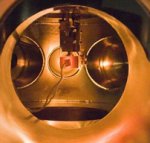Researchers at Stanford University say they have found a way to utilise both light and heat to make solar power production more than twice as efficient as existing methods – and possibly economical enough enough to compete with oil.
There is a common misconception that the hotter the weather, the better a solar panel performs. It’s quite the opposite – solar panels become less efficient as temperatures increase. Additionally, silicon solar cells can only use a portion of the light spectrum, with the rest just generating heat.
However, “photon enhanced thermionic emission,” or PETE, could surpass the efficiency of existing photovoltaic and thermal conversion technologies using a fundamentally different way to harvest energy, but using cheap and readily available materials.
The Stanford group determined that by coating semiconducting material with a thin layer of the metal caesium, the material was able to use both light and heat to generate electricity. Where silicon solar cells hit a wall at 100 degrees Celsius with efficiency also rapidly dropping off the closer to that point, the PETE device doesn’t hit peak efficiency until it is well over 200 C.
The researchers say that given the high temperatures needed for maximum PETE efficiency, the devices will work best in solar concentrators such as parabolic dishes, which can get as hot as 800 C. The PETE process can achieve 50 percent efficiency or more under solar concentration, but if combined with a thermal conversion cycle, could reach 55 or even 60 percent.
The team are working to design the devices so they could be easily added to existing systems, making conversion relatively inexpensive.
Source<br /












































